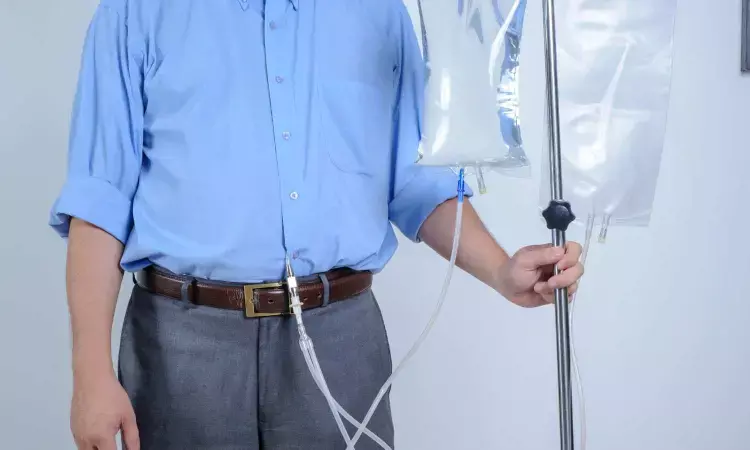- Home
- Medical news & Guidelines
- Anesthesiology
- Cardiology and CTVS
- Critical Care
- Dentistry
- Dermatology
- Diabetes and Endocrinology
- ENT
- Gastroenterology
- Medicine
- Nephrology
- Neurology
- Obstretics-Gynaecology
- Oncology
- Ophthalmology
- Orthopaedics
- Pediatrics-Neonatology
- Psychiatry
- Pulmonology
- Radiology
- Surgery
- Urology
- Laboratory Medicine
- Diet
- Nursing
- Paramedical
- Physiotherapy
- Health news
- Fact Check
- Bone Health Fact Check
- Brain Health Fact Check
- Cancer Related Fact Check
- Child Care Fact Check
- Dental and oral health fact check
- Diabetes and metabolic health fact check
- Diet and Nutrition Fact Check
- Eye and ENT Care Fact Check
- Fitness fact check
- Gut health fact check
- Heart health fact check
- Kidney health fact check
- Medical education fact check
- Men's health fact check
- Respiratory fact check
- Skin and hair care fact check
- Vaccine and Immunization fact check
- Women's health fact check
- AYUSH
- State News
- Andaman and Nicobar Islands
- Andhra Pradesh
- Arunachal Pradesh
- Assam
- Bihar
- Chandigarh
- Chattisgarh
- Dadra and Nagar Haveli
- Daman and Diu
- Delhi
- Goa
- Gujarat
- Haryana
- Himachal Pradesh
- Jammu & Kashmir
- Jharkhand
- Karnataka
- Kerala
- Ladakh
- Lakshadweep
- Madhya Pradesh
- Maharashtra
- Manipur
- Meghalaya
- Mizoram
- Nagaland
- Odisha
- Puducherry
- Punjab
- Rajasthan
- Sikkim
- Tamil Nadu
- Telangana
- Tripura
- Uttar Pradesh
- Uttrakhand
- West Bengal
- Medical Education
- Industry
Delayed-Onset Peritonitis After Root Canal in PD Patient: Doctors Report First Case

Japan: A recent case study published in BMC Nephrology has highlighted a rare instance of peritoneal dialysis (PD)-associated polymicrobial peritonitis that developed with a delayed onset following a root canal procedure.
The researchers note that peritonitis remains a major concern in PD patients, increasing the risk of catheter removal and mortality. While invasive procedures, including dental treatments, are known to cause transient bacteremia, documented cases of PD-associated peritonitis due to dental procedures are limited. Furthermore, polymicrobial peritonitis following a dental procedure has not been reported until now.
The case described by Yujiro Maeoka, Department of Nephrology, Hiroshima University Hospital, Minami-ku, Hiroshima, Japan, and colleagues involved a 60-year-old man undergoing PD admitted with acute lower abdominal pain. Examination revealed peritonitis caused by three viridans group streptococci species—Streptococcus oralis, Streptococcus vestibularis, and Streptococcus salivarius. Notably, the infection appeared nine days after the patient had undergone root canal treatment for a decayed upper molar. This delayed onset contrasts with the typical peritonitis onset following invasive procedures, which usually occurs within a week.
Despite the polymicrobial nature of the infection, the patient responded well to antibiotic therapy, and catheter removal was not necessary. His condition stabilized with intravenous cefepime, later switched to ceftriaxone, and a two-week antibiotic regimen as per the 2022 International Society for Peritoneal Dialysis (ISPD) guidelines.
Upon admission, the patient showed abdominal tenderness and distension but no signs of exit-site or tunnel infection. Blood tests revealed an elevated white blood cell count and C-reactive protein (CRP) levels, confirming peritonitis. The PD effluent was cloudy, with a high white blood cell count of 7,500/µL (neutrophils: 93.2%). Further cultures identified S. oralis and S. salivarius on day 1 and S. vestibularis on day 5.
The patient's recent dental history was reviewed to determine the source of the infection. He had undergone root canal treatment nine days before hospitalization without receiving prophylactic antibiotics. A dental examination confirmed successful treatment, with no active infection in the oral cavity. Since all detected bacterial species were susceptible to standard antibiotics, cefepime was de-escalated to ceftriaxone on day 8. The infection resolved without complications, and the patient was discharged on day 16.
"This case highlights the potential risk of delayed-onset PD-associated peritonitis following dental procedures, highlighting the importance of extended post-procedural monitoring," the authors stated. They further emphasized that since peritonitis developed beyond the typical seven-day window, careful observation for at least 10 days is recommended.
They noted that the study also raises concerns about whether prophylactic antibiotics should be considered for PD patients undergoing invasive dental treatments.
"Further research is essential to establish guidelines that can help prevent similar occurrences in the future," they concluded.
Reference:
Kubota, S., Maeoka, Y., Okimoto, K. et al. Peritoneal dialysis-associated polymicrobial peritonitis with slow onset after root canal treatment: the first case and review of the literature. BMC Nephrol 26, 137 (2025). https://doi.org/10.1186/s12882-025-04054-x
Dr Kamal Kant Kohli-MBBS, DTCD- a chest specialist with more than 30 years of practice and a flair for writing clinical articles, Dr Kamal Kant Kohli joined Medical Dialogues as a Chief Editor of Medical News. Besides writing articles, as an editor, he proofreads and verifies all the medical content published on Medical Dialogues including those coming from journals, studies,medical conferences,guidelines etc. Email: drkohli@medicaldialogues.in. Contact no. 011-43720751


